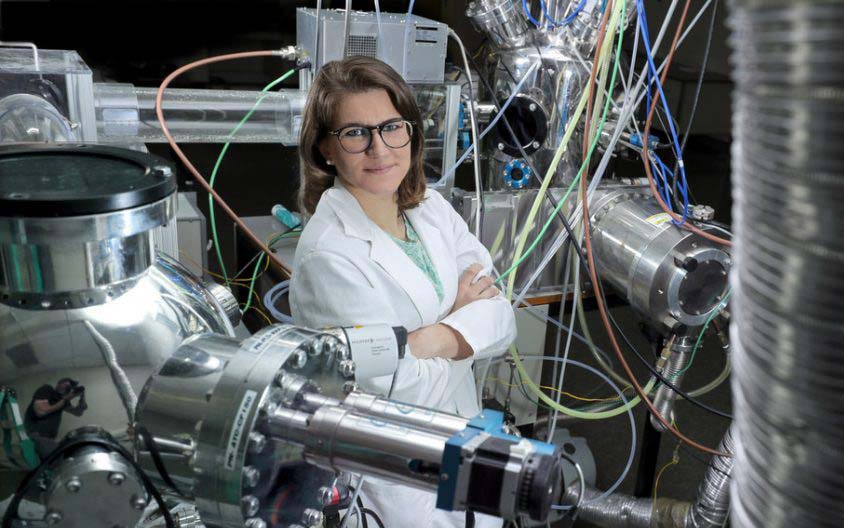Darrigues selected for competitive postdoctoral research program at UAMS
May 25-31, 2020
By Angelita Faller
A University of Arkansas at Little Rock doctoral student has been selected for a highly competitive postdoctoral scholarship at the University of Arkansas for Medical Sciences (UAMS).
Emilie Darrigues, a doctoral student in applied science with an emphasis in chemistry who is graduating in May, is one of four students selected for the UAMS Translational Research Institute Health Sciences Innovation and Entrepreneurship Postdoctoral Training Program for its class of 2022. Chosen by a competitive application process, Darrigues will begin two years of mentored entrepreneurship training on July 1.
Darrigues will be mentored by Dr. Analiz Rodriguez, director of neurosurgical oncology in the Department of Neurosurgery. Her research project will focus on improving circulating tumor DNA detection in glioblastoma liquid biopsies and designing therapeutic nanoparticles as a strategy to specifically target glioblastoma.
Darrigues honed her research skills in the labs of the UA Little Rock Center for Integrative Nanotechnology Sciences, where she’s worked as a graduate assistant for the last five years. Under the mentorship of UA Little Rock’s Dr. Zeid Nima and Dr. Alexandru Biris, Darrigues has developed her own biomedical research path and published multiple peer-reviewed papers.
“I’m very happy to see that my hard work has been rewarded, and the research is very interesting,” Darrigues said. “Dr. Rodriguez wants me to work in her lab on the development of a kind of DNA detection of brain tumors. Right now, glioblastoma is one of the deadliest brain cancers you can get. The goal of the research is to improve the diagnosis of brain cancers through a liquid biopsy, without the time and expense of going through so many other diagnostic tests. It will reduce the time of diagnosis. The earlier a patient is diagnosed, the faster they can go into therapy and treatment.”
Before coming to UA Little Rock, Darrigues earned bachelor’s degrees in chemistry and rheology/functional materials in France, followed by four years of industrial work in research and development and lean manufacturing. While pursuing a master’s degree in engineering in France, Darrigues interned at the Center for Integrative Nanotechnology Sciences as part of the Center’s exchange program in 2013. She was so impressed with UA Little Rock that she chose to pursue a doctoral degree here, which she began in 2015.
As a graduate research assistant in the Center for Integrative Nanotechnology Sciences, Darrigues studied how plasmonic gold nanoparticles interact with pancreatic cancer cell cultures in a 3D model or spheroids, with the aid of multiple imaging techniques.
Her research at UA Little Rock resulted in several awards, including first place in the graduate student poster competition at the Center for Advanced Surface Engineering Conference/Regional NSF EPSCoR program and first place in the graduate life sciences category at UA Little Rock’s 2019 Student Research and Creative Works Expo.
Now, Darrigues’s acceptance into the competitive Translational Research Program will enable her to take her already impressive research to the next level. The program is designed to help promising scientists move their discoveries into everyday practice by teaching them commercialization and team science skills.
The HSIE Postdoctoral Training Program provides support annually for eight postdoctoral fellows (four in each year of the two-year program). The program is a partnership between the UAMS Translational Research Institute and the Entrepreneurship Graduate Program in the Sam M. Walton College of Business at the University of Arkansas, Fayetteville. It is supported by the NRSA Training Core (TL1) component of the UAMS Clinical and Translational Science Award, grant TL1 TR003109.
Source: UA Little Rock Communications
PHOTO CAPTION: (Photo courtesy of UA Little Rock Communications)
UAMS’ postdoctoral research program will educate Emilie Darrigues to move her discoveries into everyday practice by teaching her commercialization and team science skills.



